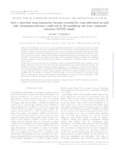Por favor, use este identificador para citar o enlazar este ítem:
http://www.alice.cnptia.embrapa.br/alice/handle/doc/854889| Título: | How a microbial drug transporter became essential for crop cultivation on acid soils: aluminium tolerance conferred by the multidrug and toxic compound extrusion (MATE) family. |
| Autor: | MAGALHAES, J. V. de  |
| Afiliación: | JURANDIR VIEIRA DE MAGALHAES, CNPMS. |
| Año: | 2010 |
| Referencia: | Annals of Botany, London, v. 106, p. 199-203, 2010. |
| Descripción: | Background: Aluminium (Al) toxicity is a major agricultural constraint for crop cultivation on acid soils, which comprise a large portion of the world's arable land. One of the most widely accepted mechanisms of Al tolerance in plants is based on Al-activated organic acid release into the rhizosphere, with organic acids forming stable, non-toxic complexes with Al. This mechanism has recently been validated by the isolation of bona-fide Al-tolerance genes in crop species, which encode membrane transporters that mediate Al-activated organic acid release leading to Al exclusion from root apices. In crop species such as sorghum and barley, members in the multidrug and toxic compound extrusion (MATE) family underlie Al tolerance by a mechanism based on Al-activated citrate release. |
| Thesagro: | Mate |
| NAL Thesaurus: | abiotic stress |
| Palabras clave: | Aluminium tolerance Multidrug and toxic compound extrusion Membrane transporters Regulation of gene expression Microbial |
| DOI: | 10.1093/aob/mcq115 |
| Tipo de Material: | Artigo de periódico |
| Acceso: | openAccess |
| Aparece en las colecciones: | Artigo em periódico indexado (CNPMS)  |
Ficheros en este ítem:
| Fichero | Descripción | Tamaño | Formato | |
|---|---|---|---|---|
| Howmicrobial.pdf | 128,9 kB | Adobe PDF |  Visualizar/Abrir |









